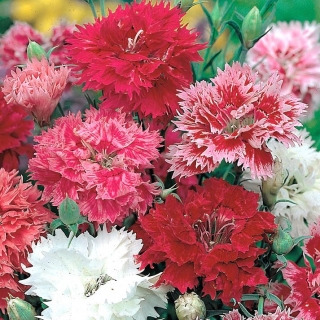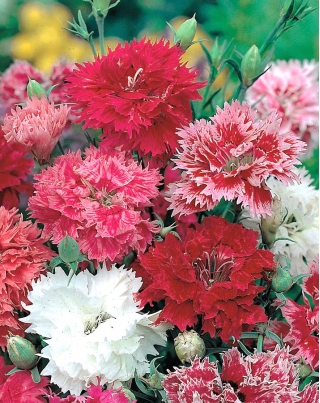The imperial fainbow (Dianthus chinensis imperialis), here offered as a variety mix, would be enough to create a mini garden full of beautifully coloured, diverse blooms. We have included seeds of the most beautiful varieties growing 20 - 40 cm tall, with double, semi-double and single blooms in this selection. Fainbow petals are usually multi-coloured in different saturated, clean shades of pink, purple and red with white markings. The blooms emerge on the tops of the thin, slender, densely branched stems gathered in small, compact tufts.
In order for the plants to develop well and strongly it is recommended to grow them from seedlings. Seeds are sown in early spring to seeding trays, boxes or hotbeds. End of spring and beginning of summer is the right time to transplant the seedlings into open field. Imperial fainbow deserves our recognition because of the abundant blooming combined with low cultivation requirements. This species loves full exposure to sun and will develop nicely in every permeable, not too dry soil. Compact tufts are sprinkled with originally frizzled, colourful, large blooms from July to October and create beautiful edgings, bright spots at the front of flower beds or a great cast in a balcony box. These plants can also be cut and put into vases.
Each package contains 1 g of imperial fainbow pink seeds. Package information contains a growing guide and the sow-by date.
- Weight: 1 g
- Height: 20 - 40 cm
- Use: Ornamental - edgings, at front of flower beds, in balcony boxes, as cut flower
- Flowering period: July - October
- Growth form: small, compact tufts
- Flower colour: pink, purple, red with white markings
- Flower type: Frizzled, large, single, semi-double, double
- Site: sunny; permeable, not too dry soil
Approximately 1100 seeds (+/- 20%)
GardenSeedsMarket - has been in business for more than a decade and from the very beginning we have made the quality of our products the top priority. Throughout the years we have delivered the best quality goods to tens of thousands of customers from all over the world. Their satisfaction proves that we had chosen the right way.
All seeds we sell are subject to a multi-level quality control checks and only then are carefully packed and dispatched. Our products have been awarded numerous certificates and comply with the highest standards of the European Union. Our employees are experienced gardeners who are more than happy to answer your every question.
Where do our seeds come from?
All of the seeds sold in our shop come from the best producers from across the European Union. Thanks to a long-standing cooperation with them we were able to develop the most adequate storing and dispatch conditions, guaranteeing that you always receive fresh and carefully tested batches of seeds. Exclusion of the middlemen from the whole process not only makes it possible for us to avoid sending out-of-date seeds that might have been lying too long on a warehouse shelf, but also ensures the most attractive price for top quality products.
The quality control process
All our seeds must pass a four-stage quality control process.
Stage one begins with a careful selection of the suppliers. Than we proceed with controlling their crops, foreign producers are not excluded from the quality control process. Plants are checked at every stage of their development: when they start to grow, during blooming and when they start bearing fruit (seeds). At this stage the most important thing is to ensure proper spacing of the plants. Thanks to that obtaining the desired morphological characteristics of each particular species or variety, such as colour, height and shape, can be ensured.
Stage two consists of a detailed verification tests in laboratory conditions. With the use of the highest quality equipment by the highly qualified staff, our suppliers perform more than 30 000 quality checks annually. The seeds that do not meet our requirements are subject to technological refining processes, including drying, cleaning, upgrading and testing again.
Stage three starts with sowing seeds in selected control plots. That way we obtain valuable, exact information concerning their germination that must be maintained at an appropriate level. Simultaneously, the varietal identity of each species is checked at this stage.
Stage four takes place in our warehouses and consists of eliminating seeds that have been stored for too long on our shelves and replacing them with new batches. Each package is stamped with a unique batch number and also with the sow-by-date.
All four stages combined allow us to state with confidence that the seeds we deliver comply with the highest standards and have completed all required control stages with flying colours.
Prizes and awards
The seeds we sell are widely recognized for their quality and have won many awards. Our seeds won numerous gold medals and distinctions for their high quality. The World of Flowers was also honoured for its innovative approach.
Among those awards there were: TOP INNOVATION (June 2015), GOLD MEDAL AT THE POZNAN INTERNATIONAL FAIR (2015), CONSUMER QUALITY LEADER (2014), FARMER OF THE YEAR (2014).
In addition, we have also been awarded the “IDEAL BUSINESS” certificate for two years in a row.
Germination
We are committed to selling only the highest quality seeds. Taking into consideration the efforts we make daily, please also note that plants are living organisms and their germination and growth depends on many factors, such as temperature, soil type, humidity and the frequency with that they are watered, sowing time and conditions, use of fertilizers and plant protection agents (pesticides), as well as weather and climate conditions. We provide help by sharing the accurate and up-to-date sowing and growing information, however, we cannot bear any responsibility for the plants that were not cultivated in conditions appropriate for given species.







